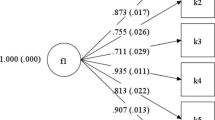Abstract
Routine Comprehensive Psychosocial Assessment was implemented antenatally at a public hospital in Sydney in 2000. The assessment, completed on all women, classifies them as (1) currently, or at high-risk of becoming, distressed, or, (2) not currently, or at low risk of becoming, distressed during the perinatal period. This pilot study followed up a sample of women (N = 50) from the latter group at 6 weeks postpartum to explore the accuracy of ‘low risk’ identification. All but one woman reported that they continued to do well during their pregnancy. By 6 weeks postpartum only one woman scored high on the validated depression measure though data from a semi-structured interview indicated that a further four women experienced sub-clinical difficulty in the early weeks postpartum. The antenatal classification of women as ‘low risk’ using this assessment method appears to be substantially accurate, though this finding needs to be replicated in a larger study.
Similar content being viewed by others
References
Appleby L, Gregoire A, Platz C, Prince M, Kumar R (1994) Screening women for high risk of postnatal depression. J Psychosom Res 38(6):539–545
Austin M-P (2003) Perinatal mental health: opportunities and challenges for psychiatry. Australas Psychiatry 11(4):399–403
Austin M-P, Hadzi-Pavlovic D, Saint K, Parker G (2005) Antenatal screening for the prediction of postnatal depression: validation of psychosocial Pregnancy Risk Questionnaire. Acta Psychiatr Scand 112:310–317
Barnett B, Glossop P, Matthey S, Stewart H (2005) Screening in the context of integrated perinatal care. In: Henshaw C, Elliott S (eds) Screening for perinatal depression. Ch 6. Kingsley, London, pp 68–82
Beck CT (2001) Predictors of postpartum depression: an update. Nurs Res 50(5):275–285
Boyce P, Stubbs J, Todd A (1993) The Edinburgh Depression Scale: validation for an Australian sample. Aust N Z J Psychiatry 27(3):472–476
Braverman J, Roux JF (1978) Screening for the patient at risk from postpartum depression. Obstet Gynecol 52:731–736
Buist AE, Barnett BEW, Milgrom J, Pope S, Condon JT, Ellwood DA, Boyce PM, Austin MPV, Hayes BA (2002) To screen or not to screen—that is the question on perinatal depression. Med J Aust 177:S101–S105
Carroll JC, Reid AJ, Biringer A, Midmer D, Glazier RH, Wilson L, Permaul JA, Pugh P, Chalmers B, Seddon F, Stewart DE (2005) Effectiveness of the Antenatal Psychosocial Health Assessment (ALPHA) form in detecting psychosocial concerns: a randomised control trial. CMAJ 173(3):253–259
Cox J, Holden J (2003) Perinatal mental health; a guide to the Edinburgh Postnatal Depression Scale (EDS). Royal College of Psychiatrists, London
Cox JL, Holden JM, Sagovsky R (1987) Detection of postnatal depression—development of the 10-item Edinburgh Depression Scale. Br J Psychiatry 150:782–786
Field T, Morrow C, Healy B, Foster T, Adlestein D, Goldstein S (1991) Mothers with zero Beck depression scores act more ‘depressed’ with their infants. Development and Psychopathol 3:253–262
Matthey S (2004) Detection and treatment of postnatal depression (perinatal depression and anxiety). Curr Opin Psychiatry 17:21–29
Matthey S, Phillips J, White T, Glossop P, Hopper U, Panasetis P, Petridis A, Larkin M, Barnett B (2004) Routine psychosocial assessment of women in the antenatal period: frequency of risk factors and implications for clinical services. Arch Women’s Ment Health 7:223–229
Matthey S, White T, Phillips J, Taouk R, Chee TT, Barnett B (2005) Acceptability of routine antenatal psychosocial assessments to women from English and non-English speaking backgrounds. Arch Women’s Ment Health 8:171–180
Matthey S, Henshaw C, Elliot S, Barnett B (2006) Variability in use of cut-off scores and formats on the Edinburgh Postnatal Depression Scale—implications for clinical and research practice. Arch Women’s Ment Health 9:309–315
O’Hara MW, Swain AM (1996) Rates and risks of postpartum depression—a meta-analysis. Int Rev Psychiatry 8:37–54
Robertson E, Grace S, Wallington T, Stewart D (2004) Antenatal risk factors for postpartum depression: a synthesis of recent literature. Gen Hosp Psychiatry 26(4):289–295
Stamp GE, Williams AS, Crowther C (1996) Predicting postnatal depression among pregnant women. Birth 23(4):218–223
Zigmond AS, Snaith RP (1983) The hospital anxiety and depression scale. Acta Psychiatr Scand 67:361–370
Acknowledgements
This project was supported by Phase 1 of the beyondblue National Postnatal Depression Research Program’ (Melbourne, Australia).
Author information
Authors and Affiliations
Corresponding author
Rights and permissions
About this article
Cite this article
Karatas, J.C., Matthey, S. & Barnett, B. Antenatal psychosocial assessment: how accurate are we in determining ‘low-risk’ status? A pilot study. Arch Womens Ment Health 12, 97–103 (2009). https://doi.org/10.1007/s00737-009-0047-8
Received:
Accepted:
Published:
Issue Date:
DOI: https://doi.org/10.1007/s00737-009-0047-8




